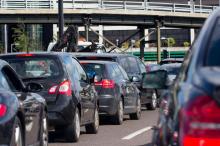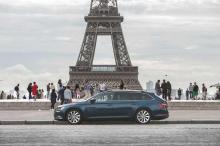Should I buy a diesel car? Everything you need to know
Diesel cars are being demonised, but are they really as bad as they're being made to seem? Here's everything you need to know if you own a diesel or are thinking of buying one...

There has been a massive U-turn in the official opinion on diesel cars. They have gone from being the most favoured – and financially incentivised – models to some of those hit hardest by punitive levels of taxation.
Anti-diesel measures came into force on 1 April 2018, when the first-year road tax (VED) rate for diesel cars rose by one band and the company car tax rate went up from 3% to 4%.
That meant a first-year road tax increase of £20 for a Ford Focus diesel with CO2 emissions of 99g/km and a rise of £300 for a VW Sharan 2.0 diesel with a CO2 output of 136g/km. The extra fee was payable for cars that fail to meet the latest Euro 6 emissions standards under new real driving emissions (RDE) testing.

In the long term, the Government has also announced that only electric cars and electric vans will be sold in the UK by 2040. The move is part of a long-term strategy to combat air pollution, which the Government says is linked to 40,000 premature deaths a year.
A government-backed scrappage scheme to help owners of older, higher-polluting diesels has been suggested, and although this hasn't happened yet, a number of car makers have introduced their own scrappage incentives.
So, should you shun diesel cars, or is it still okay to buy one? We consider the background of the diesel engine story and look at the implications for existing owners and those who are considering buying a diesel.

Why has the Government turned against diesels?
Diesel-engined cars were promoted by successive UK governments for more than a decade because they have, on average, 20% lower CO2 emissions and 20% better official fuel economy than their petrol counterparts.
These are important factors in helping to tackle climate change. Drivers appreciated the lower road tax and company car tax that were applicable to diesels and their popularity grew. Today, there are more than 10 million diesel cars on our roads and until recently they accounted for almost half of the new cars registered each year.
However, the Government now needs to address the levels of pollution in our cities, because it is being sued by the European Commission for repeatedly breaching air pollution limits. The announcement of the ban on petrol and diesel-engined cars from 2040 is part of a £3bn plan to tackle air pollution in response to the legal action.
The nitrogen oxides (NOx) produced by diesel engines are one cause of air pollution. So, as well as announcing the introduction of extra charges for the oldest, highest-polluting diesels if they’re driven in urban areas at peak times, the Government has changed the road tax banding system for new cars so that, after the first year, owners of petrol and diesel cars will pay the same rate.

How polluting are diesel cars?
Although diesel-engined cars emit more particulates than petrol ones, their CO2 emissions are generally lower. It’s also important to note that older diesels have far higher particulates and CO2 emissions than newer ones and that the European Union has been tightening up on emissions since 1992.
The first Europe-wide emissions standards, applicable to all new cars registered from January 1993, set an upper limit of 2.72g/km of carbon monoxide (CO) and 0.97g/km of NOx for diesel engines.
Significant improvements were made with the Euro 5 standard that applies to cars registered after January 2011. In order to comply with the limit of 0.18g/km of NOx, diesel-engined cars had to be fitted with diesel particulate filters (DPFs) that capture 99% of all particulate matter before it escapes out of the exhaust.
The latest diesel-engined cars (those sold from September 2015 onwards) comply with Euro 6 regulations and are the cleanest in history. As well as being fitted with DPFs, they have systems that convert most of the NOx from the engine to largely harmless nitrogen and water; by legislation, their NOx emissions cannot exceed 0.08g/km.

What other charges do diesel car owners face?
In London, drivers of diesel vehicles that do not meet Euro 6 emissions standards and petrol vehicles that do not comply with Euro 4 standards have had to pay extra to enter parts of the city since April 2019, when the Ultra Low Emission Zone (ULEZ) was introduced. It is an additional fee of £12.50 that will is payable for vehicles entering the current Congestion Charge zone 24 hours a day, every day of the year. In general, it affects diesel cars registered before September 2015 and petrols registered before 2006.
Other cities around the UK are expected to follow London’s lead by introducing similar schemes.
What’s being done to help diesel car owners cope with the extra costs?
Although there is no assistance with the cost of road tax on new diesel cars, the Government has said it wants to help owners of diesels living inside the ULEZ and other areas where low-emissions zones are introduced.
Those living inside London's Congestion Charge area receive a 100% discount on the ULEZ charge until 24 October 2021 in order to give them time to change to a cleaner car. In addition, London Mayor Sadiq Khan introduced a scrappage scheme that provides eligible vehicle owners with a cash incentive to replace older cars and vans. A £2000 grant is paid for every car scrapped, and up to £9500 for a van that's replaced with an electric car model.
What about other European cities?
There are more than 250 low-emissions zones in cities throughout Europe, so if you’re thinking of driving abroad, check such schemes along your planned route and at your destination.
Paris is among those to introduce a scheme to combat air pollution. Its Air Quality Certificate scheme bans cars first registered before 1997 from entering the city between 8am and 8pm on weekdays. It also bans motorcycles first registered before 2000 and buses and HGVs built before 2001.
Newer vehicles are rated on their emissions and will qualify for one of six different-coloured windscreen stickers that will allow access to the city inside the Périphérique ring road.
The cost of a sticker is €3.70 (£3.20) plus postage and they can be requested via the Air Quality Certification Service.
Should I avoid buying a diesel?
Despite the negative headlines, the impressive fuel economy of diesel cars means they still make more sense than petrol and hybrid car models if you do a high annual mileage or cover a lot of miles on the motorway.
In addition, the recent slump in demand means discounts on new diesel cars are higher on average than for their petrol counterparts, often enough to offset the higher tax on diesels.
Just bear in mind that, if your driving is mainly town-based, diesels really are best avoided. A diet of constant low-speed urban motoring will clog a DPF filter, and the manufacturer's suggested regimen for unclogging them may not always work, leaving you with an expensive repair bill.









